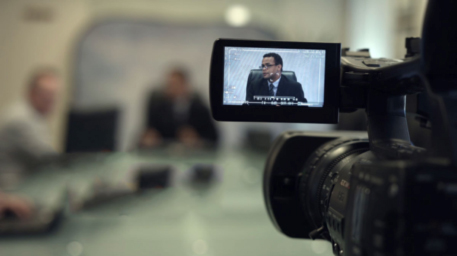By Ben Carroll
In early 2017, the Massachusetts Standing Advisory Committee on the Rules of Civil and Appellate Procedure (SAC) solicited comments on proposed amendments to the Massachusetts Rule of Civil Procedure, Rule 30. Rule 30 governs depositions upon oral examination, audio-visual depositions, and audio-visual evidence. At the time, Mass. R. Civ. P. 30 and 30A, stated that audio-visual depositions could be taken only when the parties agree or when the party seeking the audio-visual deposition obtains a court order. SAC chose to consider the practicality of AV depositions as a matter on the request of the Massachusetts Academy of Trial Attorneys (MATA). MATA made the case that, “all the other states have recognized the advantages of audio-visual depositions and allow them as a matter of right either in lieu of, or in addition to, transcripts. The Federal Rules of Civil Procedure have allowed such depositions without agreement of the parties or order of the court since 1993.”
The proposed amendments took effect in September of 2017 and was passed in large part due MATA’s work and the standing committee’s recommendation. Currently, the Massachusetts Rule of Civil Procedures Rule 30A reads, “Every notice for the taking of an audio-visual deposition and the subpoena for attendance at that deposition shall state that it is to be recorded by audio-visual means and the name and address of the person whose deposition is to be taken. If the operator is an employee of the attorney choosing the audio-visual recording, the notice shall so indicate.” Massachusetts, unlike many states still requires there shall also be prepared a simultaneous stenographic record of the deposition. Rule 30 states, “The party choosing to have the testimony recorded by audio-visual means shall bear the entire cost of the audio-visual recording, except that each party shall bear the cost for a copy of the audio-visual recording and the stenographic record.” Therefore, the attorney who wants to take an audio-visual deposition must still hire and utilize a stenographer.
However, audio-visual depositions provide a litany of benefits to practicing attorneys. By having a visual record of the deposition, attorneys can more accurately show juries, judges, and mediators the body language of whomever is being deposed whereas this was impossible or at least extremely challenging to communicate in the written testimony alone. When deposing someone who speaks English as a second language, it allows the attorneys involved to preserve a record of what the client said in their native language. This can be particularly useful if the interpreter’s translation is ever called into question.
Audio-visual depositions are also a useful tool in rooting out attorney misconduct. By preserving a real time visual record attorneys can do a better job of self-policing. For example, it is not uncommon for a judge ordered a limited deposition of an expert or particular witness. In many cases a limited deposition requires a specific amount of time and the lawyer decided to use stall or delay tactics than those tactics would be more obvious to show a judge in video than in a transcript, which is incapable of picking up pauses, or delayed speech.
Audio-visual depositions are an essential tool especially to trial attorneys and it is surprising that it took Massachusetts this long to get behind the regular and common practice of audio visual depositions. Now requesting one is a right and requires no more than a sentence to utilize this tool. A request might read, “XYC corporation, by its attorneys, will take the deposition by audiovisual mean of Plaintiff at 120 Tremont Street, Boston, MA.” That alone in a standard subpoena is enough to reserve the right to preserve a video record of your deposition.
Student Bio: Ben Carroll is the Podcast Editor on the Journal of High Technology at Suffolk University Law School.
Disclaimer: The views expressed in this blog are the views of the author alone and do not represent the views of JHTL or Suffolk University Law School.

